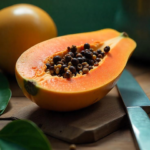How to Cure Stomach Ulcer Using Coconut Fruit
Stomach ulcers, also known as gastric ulcers, are painful sores that develop on the lining of the stomach. They are often caused by Helicobacter pylori (H. pylori) infection or excessive use of nonsteroidal anti-inflammatory drugs (NSAIDs). Coconut fruit, including its milk and water, has been studied for its potential antiulcerogenic properties due to its antibacterial, anti-inflammatory, and cytoprotective effects. Below is a detailed step-by-step explanation of how coconut fruit can be used to help treat stomach ulcers.
1. Use Coconut Milk
Coconut milk is derived from the grated flesh of mature coconuts and contains beneficial compounds that can protect the stomach lining.
- Why It Works: Research indicates that coconut milk has a strong antiulcerogenic effect. It helps reduce ulcer size by promoting cytoprotection (protection of gastric mucosa) and reducing inflammation in the stomach lining. In one study conducted on rats, daily consumption of 2 mL of coconut milk reduced ulcer size by 54%, which was comparable to sucralfate, a conventional anti-ulcer medication.
- How to Use:
- Extract fresh coconut milk by blending grated coconut flesh with water and straining it.
- Consume about 2 tablespoons (30 mL) twice daily—once in the morning on an empty stomach and once before bedtime.
- Continue this regimen for at least one week or until symptoms improve.
2. Drink Fresh Coconut Water
Coconut water is the clear liquid found inside young green coconuts. It is rich in electrolytes, vitamins, minerals, and lauric acid.
- Why It Works: Coconut water has antibacterial properties that may inhibit H. pylori growth, which is a common cause of stomach ulcers. Additionally, it reduces acidity in the stomach and provides antioxidants that combat oxidative stress associated with ulcer formation.
- How to Use:
- Drink one glass (200–250 mL) of fresh coconut water twice daily—once in the morning on an empty stomach and once in the evening.
- For best results, consume freshly harvested coconut water rather than packaged varieties.
- Continue drinking coconut water for at least one week or longer if symptoms persist.
3. Combine Coconut Milk with Honey
Honey is another natural remedy known for its antibacterial properties against H. pylori and its ability to soothe inflamed tissues.
- Why It Works: Combining honey with coconut milk enhances its healing effects by providing additional antibacterial action while coating and protecting the stomach lining.
- How to Use:
- Mix 2 tablespoons (30 mL) of fresh coconut milk with 1 tablespoon (15 mL) of raw honey.
- Consume this mixture twice daily—once in the morning before breakfast and once before going to bed.
- Repeat this process daily for at least one week.
4. Incorporate Raw Coconut Flesh
The white meat or kernel inside coconuts also contains nutrients that support digestive health.
- Why It Works: The fiber content in raw coconut flesh aids digestion while soothing irritation in the gastrointestinal tract caused by ulcers.
- How to Use:
- Cut small pieces of raw coconut flesh from a mature coconut.
- Chew thoroughly and eat about half a cup (50–75 grams) daily as a snack or part of your meals.
- You can also blend raw coconut flesh into smoothies for easier consumption.
5. Avoid Irritants While Using Coconut Remedies
While using these remedies, it’s essential to avoid substances that can worsen ulcers:
- Avoid spicy foods, alcohol, caffeine, smoking, and NSAIDs like ibuprofen or aspirin during treatment.
- Stick to a bland diet rich in easily digestible foods such as bananas, rice porridge, oatmeal, or boiled vegetables alongside your use of coconut products.
Precautions
- These remedies are supportive treatments; they should not replace medical advice or prescribed medications such as proton pump inhibitors (PPIs), antibiotics for H. pylori eradication therapy, or other treatments recommended by healthcare professionals.
- If symptoms persist after using these remedies for more than two weeks or worsen over time (e.g., severe pain or vomiting blood), consult a doctor immediately.
Top 3 Authoritative Sources Used in Answering this Question
- Phytotherapy Research Journal
This peer-reviewed journal publishes studies on plant-based therapies’ efficacy and mechanisms. The study referenced here demonstrated the antiulcerogenic effects of both coconut milk and water on indomethacin-induced ulcers in rats. - Critical Reviews in Food Science and Nutrition
This authoritative source provides comprehensive reviews on food science topics such as bioactive compounds’ roles in health promotion—including capsaicin’s role in gastric mucosal protection mentioned alongside other remedies like cayenne pepper. - National Center for Biotechnology Information (NCBI)
NCBI hosts extensive research articles related to medical conditions like peptic ulcers and their treatments using natural substances like coconuts’ antibacterial properties against H. pylori infections.


